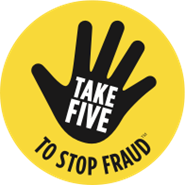
HMRC Scams
How to spot scammers pretending to be from His Majesty’s Revenue and Customs (HMRC) attempting to steal your money or personal information.
What is HMRC fraud?
HMRC scams are when scammers pretend to be from His Majesty's Revenue and Customs (HMRC) to trick you into giving them your money or personal details.
Be on your guard for criminals pretending to be from HM Revenue & Customs (HMRC) using:
- Scam emails (known as phishing)
- Sending scam texts (smishing)
- Making scams phone calls (vishing)

Fake emails and texts
Scammers send emails and texts that look like they are from HMRC, asking for your personal details or money. They may use ‘Text spoofing’ to make the sender’s name on a message seem like it’s from a genuine source. You can visit the HMRC website for its guide on how to tell if an email is genuine

Fake phone calls
Scammers call pretending to be HMRC officials. They may take an aggressive approach and threaten legal action or police arrest unless a tax bill is paid immediately. They may use Phone number spoofing to make calls look like they’re coming from a genuine call centre.

Fake websites
Scammers create websites that look like the official HMRC site to steal your information.

What to do if you get a suspicious email, text or phone call?
Don’t reply. Don’t click on a link. Don't open any attachments.
Forward suspicious tax emails to phishing@hmrc.gov.uk phishing@hmrc.gov.uk and texts claiming to be from HMRC to 60599.
Report tax scam phone calls via HMRC’s online form.
If you think you’re being targeted by a fraudulent phone call, don’t be afraid to hang up. If you have call barring, you could block the incoming number for future calls - but only if it’s not been spoofed or withheld.

Don’t share your HMRC login details
You should treat your tax login the same as your banking details - never share them with anyone, even your tax agent if you have one. If criminals get your HMRC login details, they could steal from you and make fake claims, which you would have to pay back. If you have a tax agent to help you, they should use HMRC’s digital services for agents. They should never ask you to share your login details.
How to spot HMRC fraud
- These scams come in many forms. Criminals may say you've received a tax rebate or threaten you with arrest for tax evasion
- Often, they’ll follow up a fake email or text with a phone call and ask for your account details.
- With scams phone calls, the fraudster may pretend to be from HMRC and warn you that police will come to arrest you unless a tax bill is paid immediately. The caller can be very aggressive.
- Stay alert and don’t let yourself be rushed. HMRC will never ring you and threaten arrest.
- Be suspicious of unsolicited emails, texts or phone calls, even if they appear to come from a legitimate source.
- Remember that criminals have ways of sending messages and making calls that appear to have been sent by organisations such as HMRC.
How to stay safe from HMRC fraud
- Check who is contacting you: always make sure the message or call is really from HMRC. They will never ask for personal details, like your bank information, through email or text.
- Take your time: scammers may try to rush you, telling you that you need to pay money right away. Take your time to think. If you’re unsure, contact HMRC using their official contact details.
- Look for clues that it’s a scam: watch out for signs like bad grammar, spelling mistakes, or greetings like "Dear Customer." Official messages are usually personalised with your details.
- Use official ways to contact: always talk to HMRC through its official website or phone number. If you’re unsure about a call or message, contact HMRC directly to check.
- Report scams: if you think a scammer has tried to contact you, tell HMRC about it. You can also call us, using the number on the back of your bank card to get help.

Example of HMRC scam - Outstanding HMRC tax bill
Sally* was busy working when her phone started ringing. She hastily answered it noticing at a quick glance that the caller ID said HMRC. The automated call from Officer Mark Wilson from HMRC took her by surprise.
She was urged to call the number provided immediately, with failure to do so resulting in legal consequences, including the threat of an arrest warrant. Sally was confused and shaken, the caller’s tone, although automated, sounded official and included details pertaining to their department, which led her to dismiss that this could be a scam. She hurriedly keyed in the phone number and was informed of an outstanding tax bill amounting to £4,675 that required urgent payment.
The officer urged Sally to make the payment, reinforcing that she would receive a criminal record if she refused. Panic stricken, she read out her bank details to the criminal purporting to be Mark unaware that she was in fact being scammed.
Other types of common scams
Fraud and Security
Investment scams
Protecting yourself from criminals offering fake investment opportunities.
Fraud and Security
Impersonation scam
How to spot when scammers are promoting goods or services that don’t exist.
Useful Resources

Action Fraud
Action Fraud is the UK's national reporting centre for fraud and cybercrime. This is where you should report fraud.

Get Safe Online
Get Safe Online is the UK's leading awareness resource, and offers free online security advice to help protect people and businesses from fraud and other issues.

Take Five
Take Five offer impartial advice to help prevent email, phone and online fraud. The national campaign focuses on criminals who impersonate trusted organisations and gives you tools to help fight fraud.